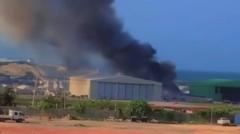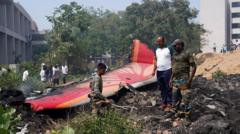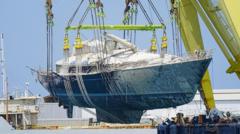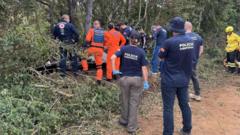In the wake of the devastating Jeju Air crash at Muan International Airport, victims' families are taking action, filing a complaint against multiple aviation officials.
Families of Jeju Air Crash Victims Seek Justice Through Criminal Complaint

Families of Jeju Air Crash Victims Seek Justice Through Criminal Complaint
Relatives urge accountability from aviation officials for negligence that led to tragic crash.
In a somber and determined effort for justice, 72 grieving relatives of passengers who perished in the Jeju Air crash submitted a criminal complaint to the Jeonnam Provincial Police agency on May 14, nearly five months after the tragic incident that claimed 179 lives. The complaint targets 15 officials, including Jeju Air's CEO, a transport minister, and airport operators, accusing them of gross negligence and violations of South Korean aviation laws.
The families assert that the disaster, which occurred on December 29 as the airplane crash-landed and exploded, was not a mere accident but a serious incident stemming from significant oversight in risk management. Legal representatives conveyed that this was a systemic failure rather than an isolated mishap.
Key figures in the complaint include Jeju Air’s CEO Kim E-bae and the Ministry of Land, Infrastructure, and Transport's Park Sang-woo, highlighting a pattern of negligence reflecting broader vulnerabilities in aviation safety. Reports have suggested that inadequate measures to prevent bird strikes and substandard airport infrastructure contributed to the severity of the crash.
The crash's specifics are shrouded in uncertainty, with lingering questions surrounding the pilot's last maneuvers and the failure of the flight recorder. Notably, the flight recorder inexplicably ceased functioning just four minutes before the disaster.
Despite the crash’s tragic consequences, an investigation by the U.S. National Transportation Safety Board, alongside the Aviation Railroad Accident Investigation Committee, is ongoing, with no definitive cause released to date. The families feel a deep sense of anger and abandonment, as expressed by Kim Da-hye, one of the bereaved family spokespersons, stating that little progress has been made since the accident.
In a bid to improve safety and prevent future tragedies, airport authorities promised to enhance infrastructure, including the replacement of certain runway barriers, the deployment of drones to monitor bird activity, and an increase in maintenance crews for budget airlines. Muan International Airport is anticipated to reopen in July, following the implementation of these newly proposed safety measures.
As families continue to seek accountability and answers, the impact of this disaster resonates, prompting discussions on broader aviation safety practices in South Korea and beyond.
The families assert that the disaster, which occurred on December 29 as the airplane crash-landed and exploded, was not a mere accident but a serious incident stemming from significant oversight in risk management. Legal representatives conveyed that this was a systemic failure rather than an isolated mishap.
Key figures in the complaint include Jeju Air’s CEO Kim E-bae and the Ministry of Land, Infrastructure, and Transport's Park Sang-woo, highlighting a pattern of negligence reflecting broader vulnerabilities in aviation safety. Reports have suggested that inadequate measures to prevent bird strikes and substandard airport infrastructure contributed to the severity of the crash.
The crash's specifics are shrouded in uncertainty, with lingering questions surrounding the pilot's last maneuvers and the failure of the flight recorder. Notably, the flight recorder inexplicably ceased functioning just four minutes before the disaster.
Despite the crash’s tragic consequences, an investigation by the U.S. National Transportation Safety Board, alongside the Aviation Railroad Accident Investigation Committee, is ongoing, with no definitive cause released to date. The families feel a deep sense of anger and abandonment, as expressed by Kim Da-hye, one of the bereaved family spokespersons, stating that little progress has been made since the accident.
In a bid to improve safety and prevent future tragedies, airport authorities promised to enhance infrastructure, including the replacement of certain runway barriers, the deployment of drones to monitor bird activity, and an increase in maintenance crews for budget airlines. Muan International Airport is anticipated to reopen in July, following the implementation of these newly proposed safety measures.
As families continue to seek accountability and answers, the impact of this disaster resonates, prompting discussions on broader aviation safety practices in South Korea and beyond.






















